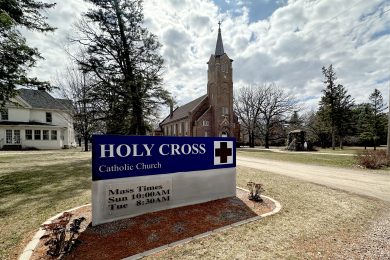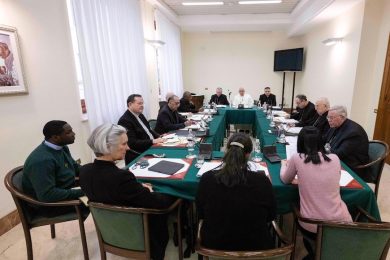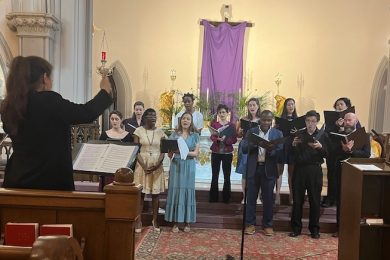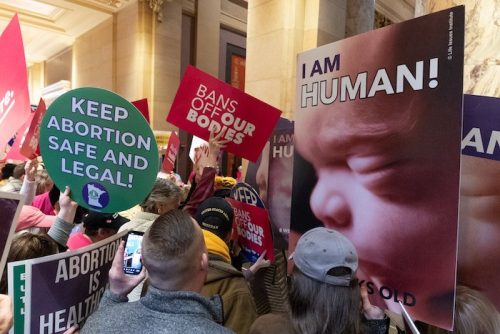By Joe Ruff | OSV News
ST. PAUL (OSV News) — In a party-line vote, Democrats in the Minnesota Senate passed a bill 34-33 in the early morning hours of Jan. 28 to place a right to abortion for any reason and without a limit on viability into state law. The House approved the measure Jan. 19 and Gov. Tim Walz, a Democrat, is expected to sign the bill into law.
Pro-life and pro-abortion advocates gathered in large numbers outside the Senate chambers at the State Capitol in St. Paul shortly before the debate began about noon Jan. 27. In that debate, which stretched over 15 hours, Democrats rejected multiple Republican amendments to the Protect Reproductive Options, or PRO Act, before the final vote on Jan. 28.
Hoping to sway lawmakers and showing support for their cause, the song “Amazing Grace” from pro-life advocates rose alongside pro-abortion chants of “we say pro-choice,” and “two, four, six, eight, separate church and state.” People holding signs that stated “Science says abortion kills a human being,” “I am human,” and “I regret my abortion” stood beside another group with signs stating slogans such as “Keep abortion safe and legal.”
Standing behind the main gathering of opposing sides was Angela Erickson, 30, with her five children, all under the age of 7. A member of the Church of St. Anne in Hamel, Minnesota, Erickson and her children drove an hour from their home to be present as the Senate took up the bill that had already passed the House 69-65 on Jan. 19.
“There’s no scourge worse than abortion,” said Erickson, a board member of St. Paul-based Pro-Life Action Ministries and co-host of Relevant Radio 1330AM’s “Living the Gospel of Life” with PLAM Executive Director Brian Gibson.
Asked how her presence with her children might be helpful at the Capitol, Erickson told The Catholic Spirit, “I want other people to see that children are a blessing and not a burden.”
Not far away stood Jon Guden, 61, of the St. Joseph Community in Rosemount, Minnesota, quietly praying the rosary.
“We can’t do it alone,” Guden said in reference to changing the minds of abortion advocates. “It requires the Lord and Mary to intervene.”
Measures to codify abortion in Minnesota — HF1 and its companion bill in the Senate, SF1 — moved quickly as the 2023 legislative session opened Jan. 3. The House saw HF1 introduced Jan. 4. The bills made their way through House and Senate hearings, with Minnesota Catholic Conference officials and Bishop Chad Zielinski of New Ulm among those testifying against them.
Democrats, who hold a majority in the House, gained a majority in the Senate in the November elections. Gov. Walz is also a Democrat.
Only hours before the full House vote, Archbishop Bernard Hebda and Auxiliary Bishop Joseph Williams of St. Paul and Minneapolis, along with Bishop Zielinski and the state’s four other Catholic bishops, including St. Cloud Bishop Donald Kettler, wrote a letter protesting the bills and had it hand-delivered to every lawmaker.
Rep. Jim Nash, R-Waconia, referred to the bishops’ letter during a lengthy floor debate before the House vote and quoted from it regarding the responsibility to protect life: “The work to limit demand for abortion, however, does not absolve the legislator from the responsibility to protect the living human being in the womb. No amount of support for public assistance programs is sufficient to exonerate one from complicity and cooperation in creating legal frameworks that facilitate the death of other human beings through legal abortion.”
“That’s a lot,” said Nash, who is not Catholic, emphasizing the moral weight of the bishops’ words. He encouraged lawmakers to find the courage to vote no and “follow that friction in your heart.”
As the Senate prepared to debate the measure that passed the House, Archbishop Hebda released a video and accompanying statement Jan. 25 urging people to reach their senators to head off approval of the bill.
“The PRO Act is part of the most extreme abortion legislative agenda in Minnesota history, allowing for abortion for any reason and at any time without regulation,” the archbishop said. “How disturbing that a pre-born child whose heart is beating, who can feel pain and who may even be viable outside the womb is treated with such disdain.”
In their letter to lawmakers, released by MCC, the bishops said they were disappointed “to see the quick pace at which these destructive bills are moving, and we hope to give legislators pause.”

Beyond codifying abortion, MCC said in a news release, the PRO Act does not distinguish between minors and adults as it directs state courts to protect the “fundamental right” to reproductive freedom, thereby opening the door to a host of fertility treatments, regardless of wisdom or ethics.
The bill states in part: “‘reproductive health care’ means health care offered, arranged, or furnished for the purpose of preventing pregnancy, terminating a pregnancy, managing pregnancy loss, or improving maternal health and birth outcomes. Reproductive health care includes, but is not limited to, contraception; sterilization; preconception care; maternity care; abortion care; family planning and fertility services; and counseling regarding reproductive health care.”
In effect, the bill could lead to minors being able to access sterilization without parental notice or consent, as well as receive hormonal contraceptives, medical treatments and sex-transition therapies without parental consent, MCC warned.
The bill also could lead to lawsuits at the intersection of bioethics and new reproductive and fertility treatments and infringe on conscience and religious liberty rights of individuals and institutional medical providers who don’t want to provide such treatments, MCC officials noted.
Minnesota’s Supreme Court found a constitutional right to abortion in the state in a 1995 ruling. Backers of legislation that would place a right to abortion into state law argue that codifying the right would add security, considering the U.S. Supreme Court in June overturned its 1973 Roe v. Wade decision that had found a right to abortion in the U.S. Constitution.
In their letter to lawmakers, the state’s Catholic bishops also urged legislators to vote against bills moving through the House, HF91, and the Senate, SF70, that would remove protections for abortion-minded mothers and their babies. Among other measures, the measures would remove protections for babies born alive after an abortion that were established in the state’s Born Alive Infant Protection Act, which requires reasonable medical care for an infant surviving abortion.
The bills also would remove parental notification requirements for minors seeking an abortion and the Woman’s Right to Know informed consent law. And the legislation would remove Minnesota’s abortion reporting law, an annual report on procedure statistics prepared by the Minnesota Department of Health. Those protections also were struck down in a lawsuit that is being challenged.






















